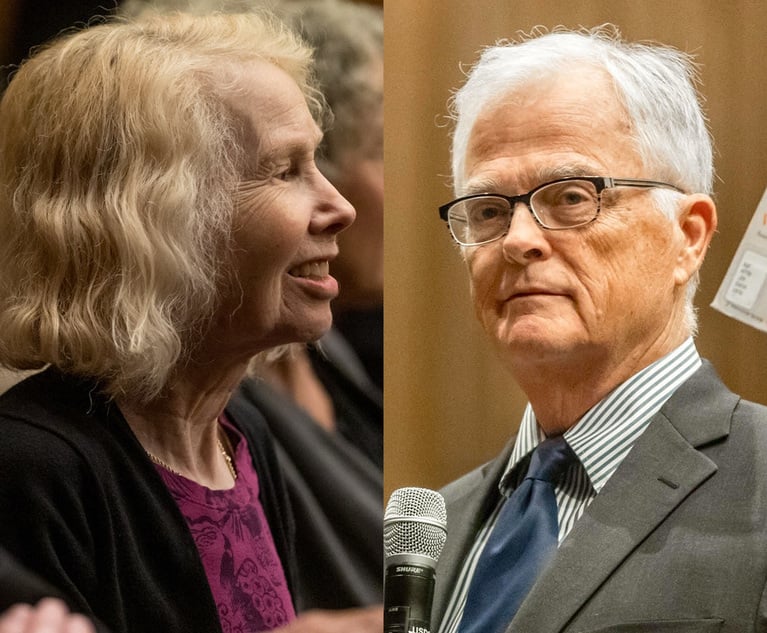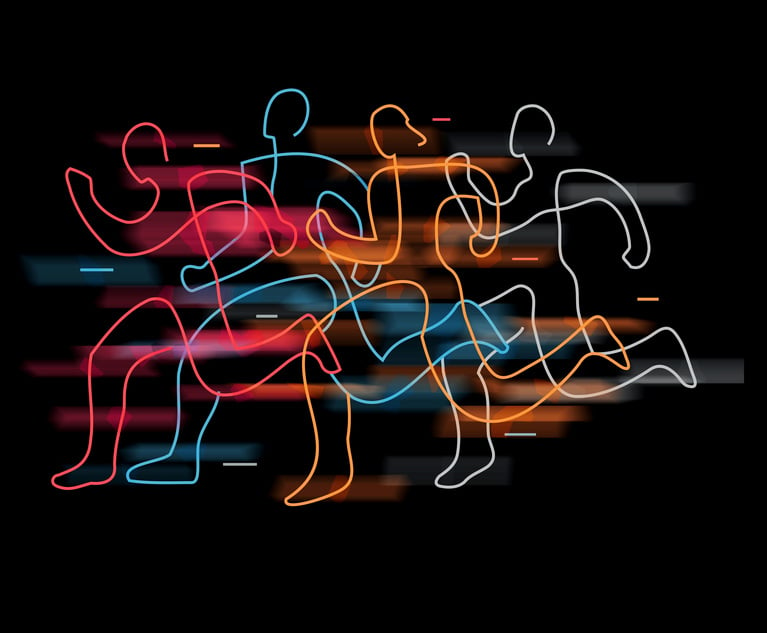 U.S. Court of Appeals for the Federal Circuit Chief Judge Sharon Prost. June 10, 2014. Photo by Diego M. Radzinschi/THE NATIONAL LAW JOURNAL.
U.S. Court of Appeals for the Federal Circuit Chief Judge Sharon Prost. June 10, 2014. Photo by Diego M. Radzinschi/THE NATIONAL LAW JOURNAL.Feds Must Pay $4.4 Million Fee Award for Unreasonable Patent Defense
Even excluding pre-litigation conduct, the government's defense of infringement by the Oak Ridge National Laboratory was not 'substantially justified,' a U.S. Court of Appeals for the Federal Circuit panel rules.
May 01, 2020 at 08:11 PM
3 minute read
The original version of this story was published on National Law Journal
The U.S. Court of Appeals for the Federal Circuit on Friday upheld a ground-breaking $4.4 million attorneys fee award against the U.S. government for patent infringement.
It's believed to be the first fee award granted under a 1996 law that provides fee shifting for independent inventors, small businesses and nonprofits who bring patent claims against the government in the U.S. Court of Federal Claims.
The government had argued that its position in Hitkansut v. United States was "substantially justified," which would absolve it of fees under 28 U.S.C. Section 1498. But a Federal Circuit panel led by Chief Judge Sharon Prost held that, even under a narrow construction of the statute that excludes pre-litigation conduct, the government's defense was not substantially justified.
The government's non-infringement positions were "factually inconsistent" with actions taken by the Department of Energy's Oak Ridge National Laboratory, which had incorporated inventor Donna Walker's patented method for strengthening manufactured materials into its thermomagnetic processing program. Oak Ridge provided interrogatory responses that "were contrary to both documentary evidence and the deposition testimony of its employees," and its enablement argument was contradicted by its own expert witness, Prost wrote.
"We agree with the Claims Court that, although 'the position of the United States' refers to litigation positions, those positions 'lack[] substantial justification' when they are 'unsupported by the facts,'" Prost wrote.
Judges Kimberly Moore and Raymond Clevenger concurred.
Walker had disclosed her patent application to Oak Ridge under a three-year non-disclosure agreement. Oak Ridge used the technology to help win some $45 million in research funding, obtain patents, author publications and receive awards, all without crediting Walker or providing additional compensation, the Court of Federal Claims found.
Walker assigned the patent to Hitkansut LLC and sued. After several years of litigation, the Court of Federal Claims found her patent valid and infringed. It awarded a $200,000 upfront licensing fee, but rejected Hitkansut's claim for about $5 million in royalties based on the research funding.
Hitkansut then moved for $4.5 million in attorneys fees and expenses.
In addition to arguing that its position was substantially justified, the government argued on appeal that the $200,000 in damages didn't justify the $4.4 million fee award.
Prost again disagreed. "Hitkansut brought exactly one claim—infringement of the '722 patent—and prevailed on it," she wrote. "The fact that it obtained less monetary relief than it may have hoped does not mean that it obtained 'limited success' as the term is used in Hensley [v. Eckerhart]."
Dickinson Wright represented Hitkansut at trial and on appeal. Partner John S. Artz had the winning argument.
Gary Hausken, the director of DOJ's commercial litigation branch, argued the appeal for the government.
This content has been archived. It is available through our partners, LexisNexis® and Bloomberg Law.
To view this content, please continue to their sites.
Not a Lexis Subscriber?
Subscribe Now
Not a Bloomberg Law Subscriber?
Subscribe Now
NOT FOR REPRINT
© 2024 ALM Global, LLC, All Rights Reserved. Request academic re-use from www.copyright.com. All other uses, submit a request to [email protected]. For more information visit Asset & Logo Licensing.
You Might Like
View All
Litigators of the Week: Simpson Thacher and ACLU Team To Challenge Louisiana's Ten Commandments Law

Should It Be Left to the Plaintiffs Bar to Enforce Judicial Privacy Laws?
7 minute read
Two Judges. 60-Plus Years on the Bench. Plenty of Advice.
Law Firms Mentioned
Trending Stories
- 1US Magistrate Judge Embry Kidd Confirmed to 11th Circuit
- 2Shaq Signs $11 Million Settlement to Resolve Astrals Investor Claims
- 3McCormick Consolidates Two Tesla Chancery Cases
- 4Amazon, SpaceX Press Constitutional Challenges to NLRB at 5th Circuit
- 5Schools Win Again: Social Media Fails to Strike Public Nuisance Claims
Who Got The Work
Michael G. Bongiorno, Andrew Scott Dulberg and Elizabeth E. Driscoll from Wilmer Cutler Pickering Hale and Dorr have stepped in to represent Symbotic Inc., an A.I.-enabled technology platform that focuses on increasing supply chain efficiency, and other defendants in a pending shareholder derivative lawsuit. The case, filed Oct. 2 in Massachusetts District Court by the Brown Law Firm on behalf of Stephen Austen, accuses certain officers and directors of misleading investors in regard to Symbotic's potential for margin growth by failing to disclose that the company was not equipped to timely deploy its systems or manage expenses through project delays. The case, assigned to U.S. District Judge Nathaniel M. Gorton, is 1:24-cv-12522, Austen v. Cohen et al.
Who Got The Work
Edmund Polubinski and Marie Killmond of Davis Polk & Wardwell have entered appearances for data platform software development company MongoDB and other defendants in a pending shareholder derivative lawsuit. The action, filed Oct. 7 in New York Southern District Court by the Brown Law Firm, accuses the company's directors and/or officers of falsely expressing confidence in the company’s restructuring of its sales incentive plan and downplaying the severity of decreases in its upfront commitments. The case is 1:24-cv-07594, Roy v. Ittycheria et al.
Who Got The Work
Amy O. Bruchs and Kurt F. Ellison of Michael Best & Friedrich have entered appearances for Epic Systems Corp. in a pending employment discrimination lawsuit. The suit was filed Sept. 7 in Wisconsin Western District Court by Levine Eisberner LLC and Siri & Glimstad on behalf of a project manager who claims that he was wrongfully terminated after applying for a religious exemption to the defendant's COVID-19 vaccine mandate. The case, assigned to U.S. Magistrate Judge Anita Marie Boor, is 3:24-cv-00630, Secker, Nathan v. Epic Systems Corporation.
Who Got The Work
David X. Sullivan, Thomas J. Finn and Gregory A. Hall from McCarter & English have entered appearances for Sunrun Installation Services in a pending civil rights lawsuit. The complaint was filed Sept. 4 in Connecticut District Court by attorney Robert M. Berke on behalf of former employee George Edward Steins, who was arrested and charged with employing an unregistered home improvement salesperson. The complaint alleges that had Sunrun informed the Connecticut Department of Consumer Protection that the plaintiff's employment had ended in 2017 and that he no longer held Sunrun's home improvement contractor license, he would not have been hit with charges, which were dismissed in May 2024. The case, assigned to U.S. District Judge Jeffrey A. Meyer, is 3:24-cv-01423, Steins v. Sunrun, Inc. et al.
Who Got The Work
Greenberg Traurig shareholder Joshua L. Raskin has entered an appearance for boohoo.com UK Ltd. in a pending patent infringement lawsuit. The suit, filed Sept. 3 in Texas Eastern District Court by Rozier Hardt McDonough on behalf of Alto Dynamics, asserts five patents related to an online shopping platform. The case, assigned to U.S. District Judge Rodney Gilstrap, is 2:24-cv-00719, Alto Dynamics, LLC v. boohoo.com UK Limited.
Featured Firms
Law Offices of Gary Martin Hays & Associates, P.C.
(470) 294-1674
Law Offices of Mark E. Salomone
(857) 444-6468
Smith & Hassler
(713) 739-1250







